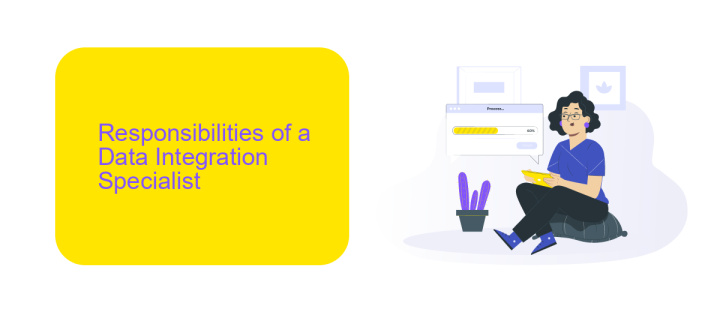Data Integration Specialist Jobs
In today's data-driven world, the role of a Data Integration Specialist has become increasingly vital. These professionals are responsible for ensuring seamless data flow across various systems, enabling organizations to make informed decisions. With expertise in data warehousing, ETL processes, and integration tools, Data Integration Specialists play a key role in maintaining data integrity and optimizing business operations.
Introduction to Data Integration Specialist Jobs
Data Integration Specialist Jobs are becoming increasingly vital in today's data-driven world. These professionals are responsible for ensuring that data from various sources is seamlessly combined, making it accessible and useful for organizations. Their role involves working with different databases, APIs, and data warehousing solutions to create a unified data ecosystem.
- Designing and implementing data integration solutions
- Maintaining and optimizing data pipelines
- Collaborating with data scientists and analysts
- Ensuring data quality and consistency
- Utilizing tools like ApiX-Drive for seamless data integration
With the growing importance of data in decision-making processes, the demand for Data Integration Specialists is on the rise. Tools like ApiX-Drive simplify the integration process by allowing specialists to connect various applications and automate data workflows. This not only saves time but also ensures data accuracy and reliability, making the role of a Data Integration Specialist indispensable in modern organizations.
Responsibilities of a Data Integration Specialist

A Data Integration Specialist is responsible for designing, implementing, and managing data integration solutions to ensure seamless data flow across various systems. They analyze business requirements, develop integration strategies, and create data mappings to facilitate the accurate transfer of information. Additionally, they work closely with data architects and software developers to ensure the integration processes align with the overall data architecture and business objectives. Regular monitoring and troubleshooting are essential to maintain the integrity and performance of the data integrations.
Furthermore, they utilize integration platforms like ApiX-Drive to automate and streamline data workflows. By leveraging such tools, they can set up and manage integrations without extensive coding, allowing for efficient and reliable data synchronization. The specialist also ensures data security and compliance with relevant regulations, conducts regular updates, and provides support to resolve any integration-related issues. Continuous improvement and staying updated with the latest integration technologies are crucial aspects of this role.
Essential Skills for Data Integration Specialists

Data Integration Specialists play a crucial role in ensuring seamless data flow between various systems and applications. Their expertise is essential for maintaining the integrity and accessibility of data across an organization. To excel in this role, a combination of technical and soft skills is required.
- Technical Proficiency: Mastery of ETL (Extract, Transform, Load) processes and familiarity with tools like SQL, Python, and data warehousing solutions.
- API Management: Understanding of APIs and experience with services like ApiX-Drive, which facilitate the integration of various platforms and automate workflows.
- Problem-Solving Skills: Ability to troubleshoot complex data issues and develop innovative solutions to integrate disparate data sources.
- Attention to Detail: Ensuring data accuracy and consistency across all integrated systems.
- Communication Skills: Effectively collaborating with cross-functional teams to understand data needs and convey technical information clearly.
By developing these essential skills, Data Integration Specialists can ensure efficient and reliable data integration processes. Leveraging tools such as ApiX-Drive can significantly enhance their ability to manage and automate data flows, leading to improved organizational efficiency and data-driven decision-making.
Career Advancement Opportunities for Data Integration Specialists

Data Integration Specialists have numerous opportunities for career advancement. With the growing reliance on data-driven decision-making, businesses increasingly seek professionals who can seamlessly integrate various data sources. This demand creates a fertile ground for career growth and specialization.
One of the key pathways for advancement is through mastering advanced integration tools and platforms. For instance, becoming proficient in services like ApiX-Drive, which simplifies the process of connecting different applications and automating workflows, can significantly enhance a specialist's skill set and marketability.
- Specializing in specific industries such as healthcare, finance, or retail
- Obtaining certifications in data integration technologies and methodologies
- Transitioning into roles such as Data Architect or Data Engineer
- Leading integration projects and managing cross-functional teams
Moreover, continuous learning and staying updated with the latest trends in data integration can open doors to leadership positions. By leveraging their expertise, Data Integration Specialists can evolve into strategic roles, influencing organizational data strategies and driving innovation.
Conclusion: Data Integration Specialists in High Demand
The demand for Data Integration Specialists continues to rise as businesses increasingly rely on seamless data flow across various platforms to drive their operations. These professionals play a critical role in ensuring that data from disparate sources is accurately combined and made accessible for analysis, decision-making, and operational efficiency. Their expertise in integrating complex data systems is invaluable in today's data-driven world, making them a crucial asset for any organization aiming to leverage data to its fullest potential.
Services like ApiX-Drive have become essential tools for Data Integration Specialists, offering streamlined solutions for setting up and managing data integrations. By automating the data transfer process between different applications and services, ApiX-Drive helps specialists save time and reduce the risk of errors. This allows them to focus on more strategic tasks, such as optimizing data workflows and ensuring data quality. As the need for efficient data integration grows, the role of Data Integration Specialists will only become more vital, underscoring their high demand in the job market.
FAQ
What does a Data Integration Specialist do?
What skills are essential for a Data Integration Specialist?
How do Data Integration Specialists ensure data quality?
What are some common challenges faced by Data Integration Specialists?
What tools are commonly used by Data Integration Specialists for automation and integration?
Apix-Drive will help optimize business processes, save you from a lot of routine tasks and unnecessary costs for automation, attracting additional specialists. Try setting up a free test connection with ApiX-Drive and see for yourself. Now you have to think about where to invest the freed time and money!

